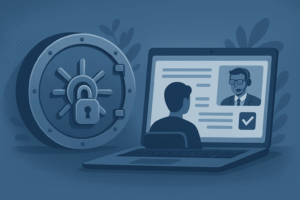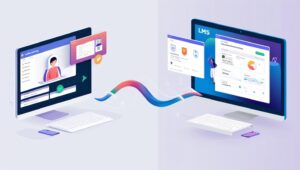Institutions are significantly shifting from traditional paper-based exams to computer-based exams in today’s rapidly evolving educational landscape. Various factors fuel this transition post, including technological advancements, convenience for students and educators, and the imperative need for efficient evaluation methods. It will explore the importance of online proctoring in this transformative process and why institutions embrace online exams.
The Digital Revolution in Education
The digital age has ushered in significant changes across various industries, and education is no exception. Traditional pedagogical methods have been gradually giving way to innovative approaches that harness the power of technology. One of the most prominent developments is the transition from paper-based to online exams. With online exams, educational institutions can leverage technology to create a more dynamic and adaptable assessment environment.
Online exams allow for integrating multimedia elements, interactive questions, and real-time feedback. They cater to the diverse learning styles of today’s students, making the educational experience more engaging and effective. Moreover, online exams are inherently scalable, efficiently accommodating many students. This scalability becomes especially crucial when considering the demands of online and distance learning.
The Convenience of Online Exams
One of the primary drivers behind the shift to online exams is the convenience they offer. Students and institutions alike benefit from the flexibility and accessibility that online exams provide. Students can take exams from anywhere with an internet connection, eliminating the need for a physical exam venue. This is particularly advantageous for distance learners, working professionals, or those with busy schedules.
Institutions also enjoy streamlined administrative processes when conducting online exams. The digital format reduces the logistics of organizing and proctoring exams, leading to cost savings and increased efficiency. Online exam scheduling is flexible and less strenuous on resources such as classrooms and invigilators.
Uncovering the benefits for students and institutions
- Flexibility:
Online exams offer a high degree of flexibility to both students and institutions. This flexibility manifests in several ways:
Location Independence: Students can take online exams virtually anywhere with an internet connection. This eliminates the need for a specific physical exam venue, reducing travel time and costs. It’s especially beneficial for distance learners, international students, or those with other commitments.
Scheduling Freedom: Online exams can often be scheduled within a broader timeframe, giving students more control over when they take their assessments. This flexibility accommodates students with diverse schedules, such as working professionals, part-time students, or those juggling multiple courses.
Adaptive Timing: Some online exam platforms offer adaptive timing, meaning that students receive varying time limits based on the complexity of each question. This ensures that students have sufficient time for more challenging questions and don’t feel rushed.
Customization: Instructors can design online exams to adapt to different learning styles. They can include a mix of question types, such as multiple-choice, essay, and interactive questions, catering to a broader range of student abilities and preferences.
- Accessibility:
Online exams enhance accessibility in multiple ways, making education more inclusive and accommodating:
Disability Accommodation: Online exams can easily accommodate students with disabilities. Features like screen readers, voice-to-text software, and customizable text size integration can meet individual needs. This ensures that students with disabilities have equal access to assessment opportunities.
Language Support: Online exams can be offered in multiple languages, making them accessible to international students who might not be fluent in the primary language of instruction. This inclusivity encourages diversity in educational institutions.
Reduced Environmental Impact: Online exams lessen the need for printed materials, which is more eco-friendly and benefits students with environmental concerns. This aligns with the broader trend of sustainability in education.
- Scalability:
The scalability of online exams is a significant advantage for institutions, especially those dealing with large student populations:
Efficient Resource Utilization: Conducting traditional paper-based exams for many students requires significant resources, including classrooms, invigilators, and printed materials. Online exams reduce these resource demands. Institutions can handle more students simultaneously without expanding physical infrastructure.
Cost Savings: Institutions can realize cost savings with fewer physical resources. This includes reduced expenses related to printing, logistics, and hiring additional staff for proctoring. These cost savings are available for reinvestment to improve the overall education quality.
Scalable Assessment Tools: Online exam platforms often come with tools for automated grading and analysis. This streamlines the assessment process, allowing instructors to assess and provide feedback to more students efficiently. It also provides valuable data on student performance, which can inform instructional improvements.
Ensuring Exam Integrity with Online Proctoring
The transition to online exams comes with challenges, especially in maintaining exam integrity. Academic dishonesty, such as cheating, has always been a concern, and the digital landscape presents new opportunities for malpractice. This is where online proctoring plays a crucial role.
Online proctoring refers to using technology to monitor and secure online exams. It comes in various forms, including live proctoring, in-classroom proctoring, and remote proctoring. Proctortrack is an example of online proctoring software institutions can use to ensure exam integrity.
Online proctoring software employs various methods to monitor students during exams, such as video and audio recording, screen sharing, and AI-driven analysis of behavior patterns. Hence, this comprehensive approach enhances security and reduces the likelihood of cheating. Additionally, the data collection during online proctoring is useful to identify unusual behavior or potential breaches of academic integrity.
Proctortrack: A Leading Online Proctoring Software
As online exams become more prevalent, the choice of proctoring software becomes crucial. Proctortrack stands out as a reliable and comprehensive solution for institutions seeking to maintain exam integrity in the digital realm. This online proctoring software employs state-of-the-art technology to ensure secure and fair exams.
Proctortrack utilizes AI algorithms to monitor students’ activities during exams, flagging any suspicious behavior for further review. This includes looking away from the screen for extended periods, accessing unauthorized materials, or using external communication tools. The software also provides real-time alerts to proctors, enabling them to intervene when necessary.
Summing up
In conclusion, the shift from paper-based exams to computer-based exams, supported by online proctoring solutions like Proctortrack, represents a significant advancement in education. Therefore, Online exams offer convenience, scalability, and improved student engagement, while online proctoring software enhances exam security and preserves academic integrity. Hence, educational institutions are adapting to the digital age, and embracing online exams and robust proctoring solutions becomes essential for ensuring fair and reliable assessments.











